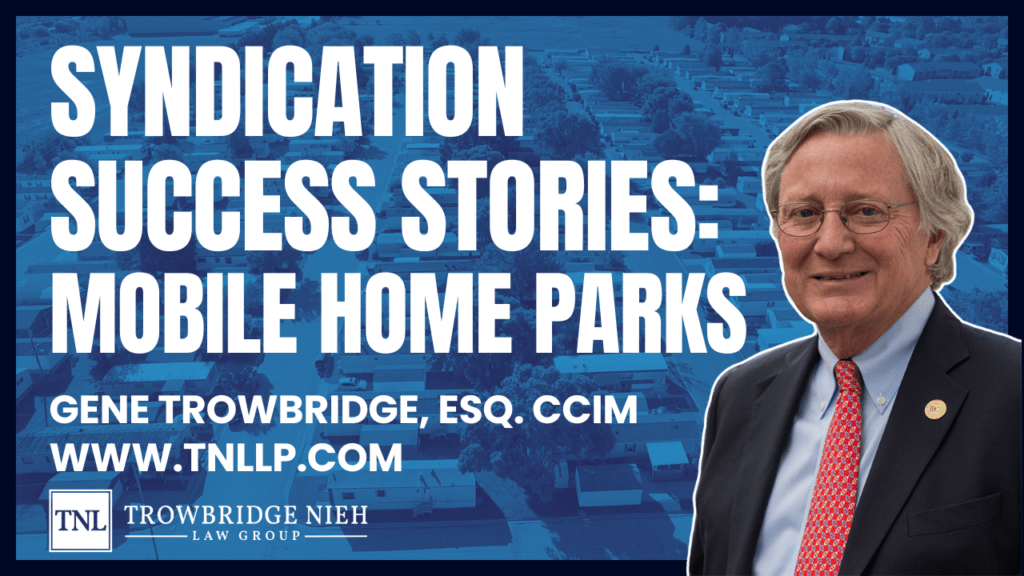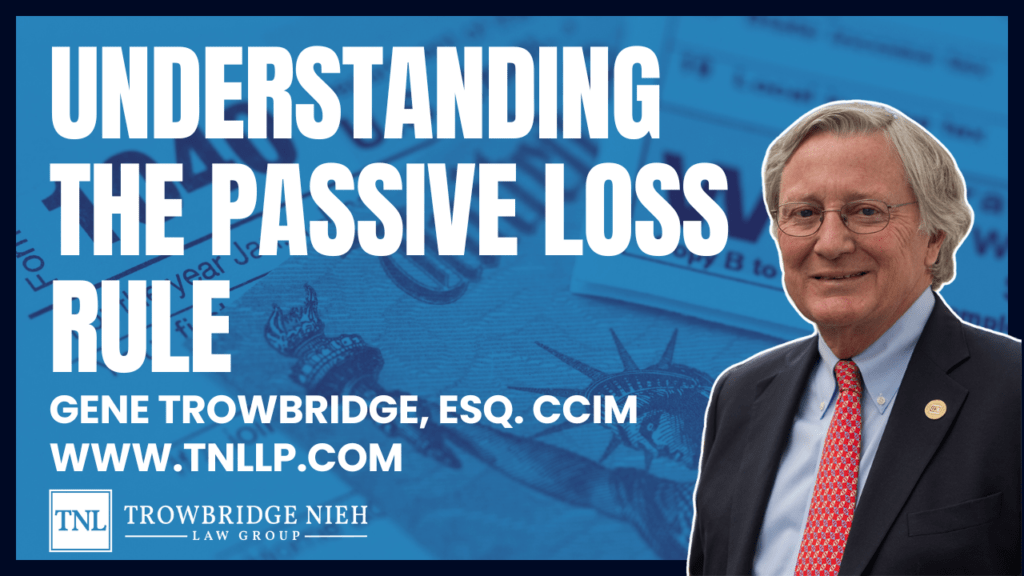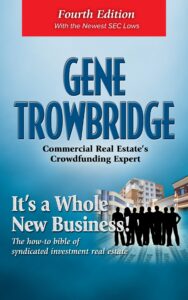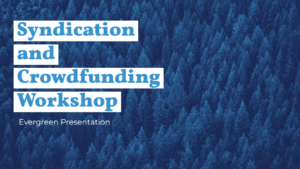Myths Syndicators and Investors NEED to know about.
In this TBD with TLG, syndication attorneys Gene Trowbridge and Jonathan Nieh discuss the biggest money raising myths that both syndicators and investors should know about.
Transcript
 | GT | Welcome to today's episode of TBD with TLG, I'm Gene Trowbridge. And this is my partner, Jonathan Nieh. And Jonathan today our TBD topic is, are you ready? |
                             | JN | What is it? |
                             | GT | Money raising myths. Now why this is important is when you're selling a security the way most of our clients do it under regulation D you're raising money from investors you're putting it in a common enterprise, you are telling the people we're gonna expect a profit and you're making it happen. You've entered into the securities world. And so in the security's world under regulation D there are two ways you can raise money. One is advertising and another is without advertising. So a lot of our clients Jonathan want to raise money without advertising because that allows them to take sophisticated investors not be limited to just taking accredited investors which is what happens if they take advertising. 506 says, if you advertise you can only take accredited investors 506b says, no advertising. You can take sophisticated investors. So Jonathan, what they do, they come to us and say, well, I'm not gonna advertise because I know that if I do any one of these things we're gonna talk about today, it's not advertising. That's basically the idea of it, right Jonathan? . Yeah. Yeah, they hear these things online. |
                             | GT | So I'm gonna kind of hit you out of the TBD world. Jonathan, what's the number one thing they tell you that's a myth that really could be advertising but they don't think it is. I'm trying to think of what you're trying at get out Gene. They don't think it's advertising, maybe posting on Facebook. |
                             | JN | That'd be a good one. |
                             | GT | Yeah. |
                             | JN | That might, is that advertising? |
                             | GT | Yeah. I mean, it doesn't matter what the medium is as long as you're broadcasting it to people that you don't know that could be advertising. |
                             | JN | Okay. Yeah, absolutely. And I think some of the other things we're getting at are the myths that we hear about when people say, "Well, no, I'm gonna to I'll throw one out there, I talk to the person three times." |
                             | GT | The three touch rules. |
                             | JN | The three touch rule, okay. I hear that all the time. And the three touch rule is kind of interesting because what you need as a syndicator with the relationship with your investor to defend an argument about advertising is that you have a pre |
                             | GT | Another one I hear a bit is the 30 day rule. So there's the idea if you meet someone and then you wait 30 days, after that period now you have a substantive relationship with them. And now you can take them into your 506b offering. And I think that also comes from a no action letter too, right? |
                             | JN | Well, it does come from a no |
                             | JN | Yeah. I think we're giving away free copies of the book. As long as they subscribe to our YouTube channel. Click the subscribe button down there. |
                             | GT | Good. Good. And then we'll get to you on how, we we probably need an address, a name and an address and we'll send you a copy of the book. We're gonna be happy to do that. So we've talked about the three touch rule. We've talked about the 30 day rule. What's another myth that people talk to us about. |
                             | JN | So, one that I see a bit often is doing a friends and family offering. If you only raise money from friends and family, you don't have to do a a full |
                             | GT | Those people must think that if it's friends and family, it's not a security. |
                             | JN | Yeah. Yeah. That's what they think. |
                             | GT | But it is a security. You're still raising money for a competent enterprise and people are investing because they think it's a profit and you're gonna make it happen. Right? Unless you make it a member managed and we won't get into that too much. But if there's, if you're like me I only have two family members. The three of us could go together and do something but I'm not gonna run it. We'll all make all the decisions unanimously and on and on and on. So that might not be a security. But if it's a manager managed LLC it's a security and friends, and family I don't believe get any special protection in the law. Do they, Jonathan? |
                             | JN | No. I think the logic behind it is, your friends and family, people that are closest to you, something goes wrong, they're not gonna sue you or go after you, right. But, it happens all the time where friends and family break up because money is involved, so, |
                             | GT | Sure. |
                             | JN | You never know. |
                             | GT | I hadn't thought about this in my preparation for this but there's two other things that there's more to talk about, but there's two things that just come to mind money raising myths. The under the radar myth. Under the radar myth is that your offering is so small, no, one's gonna care about it. No, one's gonna hear about it. And then everything's gonna be fine. Okay. That's great that won't help you as a defense against advertising. And the other one, Jonathan is the good deal exemption, right? If you're sure it's gonna be a good deal, who cares if you advertise or not because everyone's gonna make a lot of money and they're not gonna go after you. I wouldn't count on that one. I wouldn't count on either of those two. So we've done three touch, 30 days, friends and family. Jonathan, somewhere along the line I think I've had people say, "Well, I'm gonna raise less than a million dollars." So it's not a security, so I can advertise. I can do whatever I want. Is there any, any substance to that exception? |
                             | JN | No. I mean, if you're doing a reg D offering there's no minimum amount. You could raise a dollar from investors and you're still selling security, so it doesn't matter. |
                             | GT | And that's another myth. Any other ones? |
                             | JN | One I've heard before is self |
                             | GT | So you, so you actually think some people come to you and talk to you about the fact that as long as everyone's accredited I don't have to worry about the advertising rule regardless of whether I do a B or a C? |
                             | JN | No, it's more of people doing a B. And they think that all they need to do to, make sure that they're, they have a good group of investors, it just give their investors a form that says, 'Are you accredited investor?' |
                             | GT | Oh. |
                             | JN | Check the box saying that, right? |
                             | GT | So you're explaining, you're saying in a B, some people say if the investors are accredited, I don't have to have a pre |
                             | JN | Yeah. And all they're relying on is that. All they're relying on, is that investor just checking a box. |
                             | GT | Yeah. That's wrong. That's wrong. That's nasty. The other one I've heard is less than 10 people. |
                             | JN | Mm. |
                             | GT | Now the less than 10 people kind of goes along with the one that I've heard, if you raise less than a million. Those probably come from some state rules. There's a possibility that you could do a securities offering on an interstate basis. Everything is inside of your state. And each state has their own, their own rules. Like Texas, the rule is 35 people, with whom you have a preexisting relationship and really nothing more than that, but every state is a little different. So you might have heard that in your state you can do a private placement for less than a million or you can do a private placement for less than 10 people but you still have to follow the state rules. So you'd need the state attorney to give you advice on all that. Now, can you think of any other myths we ran into? |
                             | JN | I've heard another one where people don't think they need a PBM, |
                             | GT | Okay. |
                             | JN | if certain conditions are met. |
                             | GT | What conditions would mean would relieve you of the responsibility of giving an investor a PPM, What have you heard? |
                             | JN | So, I mean, legally, the rule is that if you have any investors that are not accredited a PPM is required by law. So the thinking is, okay, if all my investors are accredited, then I don't need a PPM. But I mean, you're still require to provide all the material information to your investors in some form or another, right. It doesn't necessarily have to be a PPM. But, might as well just do a PPM, right? |
                             | GT | Well, absolutely. And I look at some of the ones that we do, they put together a property package. They put together the operating agreement. They have a good subscription agreement that outlines risks and conflicts and all their vestors are gonna be accredited and have invested with them before. I mean, so I put a staple on all that stuff. You could call it a PPM. Okay. You still have to give them the information. But when you start with a lot of people you need a disclosure document that tells the story, right? Isn't that what we call our BPM, the story story? |
                             | JN | Yeah. Story offering. |
                             | JN | Then they pick the story and then the other documents fulfill the rules of how that story is gonna run. |
                             | GT | We have experienced, Jonathan and I have a have a client in the company for whom we've done, 108 offerings in the last four years, which is a lot. And they do 506b's. They only take accredited investors and their funds are closed to new investors. So everyone has a preexisting relationship based on the fact they've invested with them before. Everyone is accredited. Those would be two reasons and they don't advertise. Those would be two reasons that you would not need a PPM. And I've done 108 PPMS for them. Because they need to disclose the information, and they need disclose the information all the same information to all the investors, every single time. And as deals come and go and change, today you might be talking to an investor about something and two weeks from now you're with a different lender and different terms. Did you tell the investors in the new terms? So you're just safe in doing doing a a PPM and whatever format that takes. I think that's the, that's the safest the safest thing to do. I think. Anything else, Jonathan? |
                             | JN | I mean, those were like the most common ones. I think we hear a lot. |
                             | GT | How about having other people raise money for you? We got a couple minutes to go through that one. |
                             | JN | I mean, that's a whole can of worms. Didn't we do a podcast about that already? |
                             | GT | It bears repeating. |
                             | JN | Yeah, people think that you could pay referral fees to people to go find investors for you. But basically, just don't pay other people to raise money for you. I think that was the, |
                             | GT | Right. Unless they have a license. |
                             | JN | Yeah. Unless, |
                             | GT | Unless they're a registered investment advisor or a securities person. Just do that. 'Cause I know that the SCC is after those types of relationships right now. And all you, what you don't want to be called is an unregistered broker dealer. which is what they call people who raise money for other people and don't qualify for the issuer exemption. So on our YouTube channel, we probably have I don't know if we publish it yet but we probably have a video on that very issue. So what's gonna happen next week, Jonathan? |
                             | JN | I don't know. Maybe we'll do another podcast same time Thursday at noon Pacific. I think that's our normal time. We do these writings. |
                             | GT | That's right. And make sure to go to, to click down here and subscribe to our YouTube channel. And while you're doing that, and while I'm sending out all these books, Jonathan and I will think about what the topic is next time, which is always TBD |
                             | JN | Yeah. Or people could write in the comments. If you, |
                             | GT | They could write a comment and suggest a topic. There's a lot of topics Jonathan. We'll be here to ride an old man. All right. Thanks Jonathan. And join us next week at 12 o'clock on Thursday, Pacific time. |





